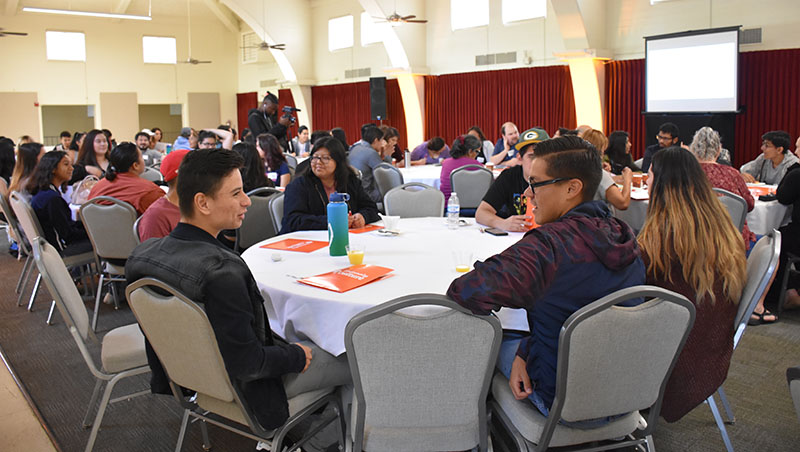 Dec. 11, 2018 — Vulnerable student populations at CSU Channel Islands (CSUCI) are benefitting from two separate grants from one local and one national organization.
Dec. 11, 2018 — Vulnerable student populations at CSU Channel Islands (CSUCI) are benefitting from two separate grants from one local and one national organization.
Professor of Chicana/o Studies Jose Alamillo and Assistant Professors of Sociology Luis Sanchez and Karina Chavarria applied for the local grant of $3,000 from the Social Justice Fund of Ventura County in support of a project called “Immigrant Empowerment.”
The national grant for $6,000 came from the Association of American Colleges & Universities (AAC&U) to CSUCI’s Student Academic Success & Equity Initiatives in support of a project entitled the “AAC&U/Endeavor Fund Transfer Student Success.”
The grant resulted from a collaborative effort between Santa Barbara City College (SBCC), CSUCI and the AAC&U.
The AAC&U grant will strengthen an ongoing program that helps transfer students learn about the opportunities available if they pursue a four-year degree after completing community college.
“In our region, especially in Ventura County, college-going rates are low,” explained Assistant Director for Student Success & Equity Initiatives Michelle Hasendonckx. “Students who start their education at a community college are less likely to go on to a four-year university. So we want students at community colleges to know what options are available to them.”
CSUCI and SBCC began their collaboration three years ago with the goal of improving student transfer success.
The AAC&U got wind of their collaboration and threw their support behind it and four similar partnerships across the nation. Then, this summer, CSUCI and SBCC were among three partnerships chosen by the AAC&U to receive a grant.
CSUCI’s grant was used to enhance the fourth annual Transfer Academy, held in September. The Academy is a day-long conference in which community college students come to the CSUCI campus to learn about the benefits of a four-year degree, and get step-by-step guidance on how to transfer from a community college to a four-year college, how to get financial aid, etc.
“Overall the turnout was a lot higher than we expected,” said CSUCI’s Transfer Student Success Activity Director Verónica Montoya, who organized the conference. “With the grant, we were able to provide transportation to students from both Oxnard College and SBCC. We drew in students who might not otherwise be able to attend.”
Also, the grant allowed student mentors to visit all of Ventura County’s community colleges and SBCC to tell students about the Academy and their journeys toward a four-year degree.
The “Immigrant Empowerment” project is still in its planning stages, but will be designed to provide undocumented immigrant students and their families information about their rights.
The grant will fund the recruitment of CSUCI students to develop workshops about immigrant rights which they will take to area high schools with higher populations of students from immigrant families. In addition, students will be trained to analyze local data related to the social and economic conditions of the county’s immigrant population.
“Many high schoolers and young people in general don’t know the rights they have when dealing with immigration officials,” Alamillo said. “A lot of parents shield their children from this information and they go to apply to college and learn they are undocumented.”
Six CSUCI students will be selected and trained to do these workshops. Two will create a web site that will act as a clearinghouse for resources available in the county such as immigration attorneys. All six will receive a $500 stipend made possible by the grant.
Alamillo said the committee is in the process of selecting six students and is going over plans to work with immigrant rights advocates such as the Central Coast Alliance for a Sustainable Economy (CAUSE); Mixteco Indigenous Community Organizing Project (MICOP) and Conejo Connections, a Thousand Oaks group for high school students with Deferred Action for Childhood Arrivals (DACA).
“In the future, with more citizenship information events, people won’t be intimidated or afraid to come out of the shadows,” Alamillo said. “They have resources.”
